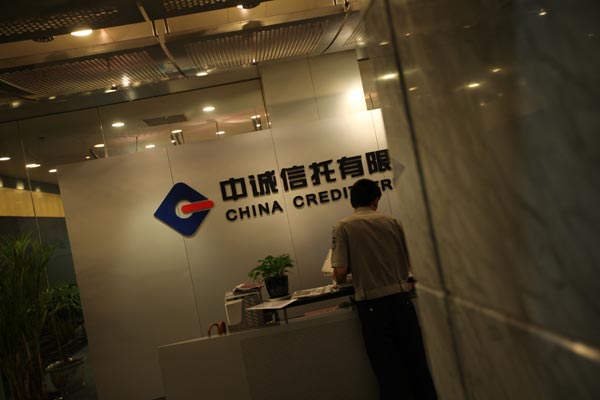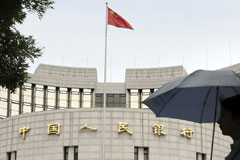|
 |
|
A China Credit Trust Co Ltd branch in Beijing. The company is dealing with a 3.3 billion yuan ($545 million) trust product that was set to default. This high-yield wealth management product was sold by Industrial and Commercial Bank of China. |
A struggling trust product that owed investors 3.3 billion yuan ($545 million) promised on Monday to reimburse those investors, avoiding a situation that analysts said could have triggered a chain of defaults across the nation's trust and banking industry.
The situation is a test case for cleaning up the risky "shadow banking" system in the world's second-largest economy.
Local media reported that after telling investors it was insolvent, the so-called "Credit Equals Gold #1 Trust Product" has now promised to pay back principal and some interest to them. Payments will be made before the end of the month, if investors accept the offer, the trust firm said.
The high-yield product was sold by Industrial and Commercial Bank of China Ltd, the nation's biggest lender by assets, on behalf of China Credit Trust Co Ltd, which promised returns of 10 percent a year.
China Credit Trust released a statement on Monday saying that an agreement "with a certain number of interested investors" had been reached and urging investors to contact their client managers as soon as possible.
Neither ICBC nor China Credit Trust returned calls for comment from China Daily on Monday.
The trust program raised funds from investors in 2010 to put into an unlisted coal company, Shanxi Zhenfu Energy Ltd.
But after its vice-chairman was arrested in 2012 for illegally raising funds, the company nose-dived.
Product disclosures released Jan 16 showed that of the 4.35 billion yuan that was due, only 670 million yuan has been paid out to investors and that the trust lacked the money to repay the remaining 3.3 billion due on Jan 31.
Analysts and investors at home and abroad are watching closely, as a default could open floodgates in the nation's $1.67 trillion trust industry.
Chinese "shadow banking" is a network of lending outside formal channels and beyond the reach of regulators. It covers activities by online financing platforms, credit guarantee companies and micro-credit firms.
The industry was as large as $4.8 trillion in 2012, equaling more than half the country's gross domestic product, according to ratings agency Moody's. Investors Service Inc.
The State Council, the country's cabinet, reportedly issued internal guidelines in December to crack down on the sector, although rating agency Fitch Ratings Inc has commented that "the reforms seem like a good beginning, but they have a long way to go".
 |
 |
|
|
|
|
|
|
|
|
